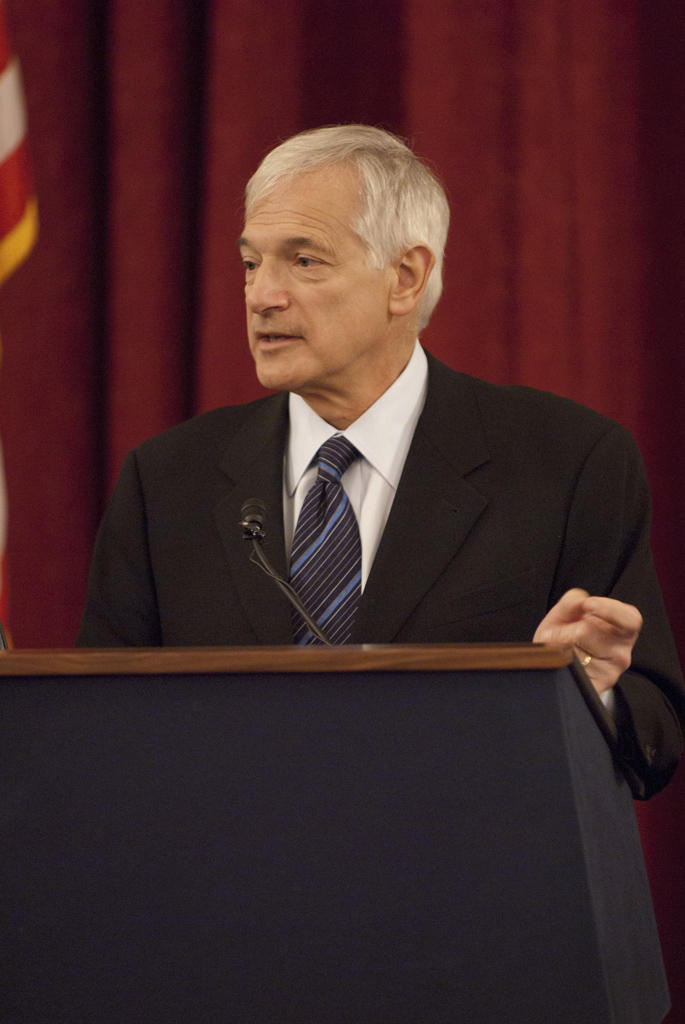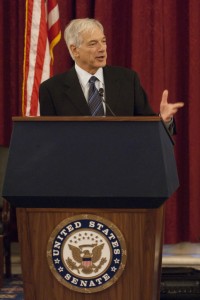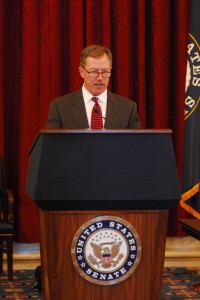
Dr. Robert Gallucci: Iran has no reason for an enrichment program
Podcast: Play in new window | Download
Subscribe: Apple Podcasts | RSS
Washington D.C., 25 March 2012- Today, Dr. Robert Gallucci, the former Assistant Secretary of State for Politico-Military Affairs and chief negotiator during the 1994 North Korean nuclear crisis, spoke and lead a discussion at an event sponsored by the American Security Project entitled, “The Iranian Nuclear Program: Status and Prospects.” In conjunction with the event, the American Security Project also released a Fact Sheet on basic geo-political Iran facts, and a Fact Sheet on the most important U.S. legislation, executive orders, and pending legislation on to Iranian sanctions.
Dr. Gallucci spoke about how he believes that diplomacy can and should be allowed to work, the Iranian nuclear program does not need enriching capabilities, and the robustness of Iran’s nuclear weapons program.
He began the discussion on the Iranian nuclear program by talking about the Israeli triggers for a strike. He believes that, unless something particular happens, for example the discovery of Iran enriching and stockpiling highly enriched Uranium, or the discovery of another secret nuclear site, or the continual building of a “robust” breakout capacity, Israel will not act unilaterally.
However, that if these triggers were reached in conjunction with an Israeli belief that the United States would not attack because of these triggers, it would launch a strike to degrade and reduce the Iranian nuclear program.
Dr. Gallucci then proceeded to discuss three vital requirements for successful diplomacy with Iran to succeed. The first is that Iran’s isolation, politically, financially, and economically, has had a huge impact on Iran and must be continued through multi- and unilateral sanctions. The extent that this pressure succeeds depends on how isolated Iran is within the international community.
The second requirement is that Iran must understand that the United States will not allow its nuclear program to continue and will resort to military action to prevent it from continuing.
The third requirement for successful diplomacy is there needs to be a “yesable” diplomatic proposition that both sides can agree on. But Dr. Gallucci believes that any agreement with Iran must halt uranium enrichment to 20% and the removal of those stock piles. An agreement must also include an enrichment limit to 5% and a limit to a 5% stockpile.
 Because Iran is a rational actor, albeit one with a different risk propensity, so Iran can be deterred from proceeding with its nuclear program by the United States. However, one of the major threats from the Iranian nuclear weapons program is that while Iran may be deterred from using a nuclear weapon, it would not be deterred from providing nuclear material to non-state actors for their use.
Because Iran is a rational actor, albeit one with a different risk propensity, so Iran can be deterred from proceeding with its nuclear program by the United States. However, one of the major threats from the Iranian nuclear weapons program is that while Iran may be deterred from using a nuclear weapon, it would not be deterred from providing nuclear material to non-state actors for their use.
Closing out his talk, Dr. Gallucci discussed how Iran does not need the large enrichment program it has for its single power reactor in Bushehr, “Iran with a single power reactor at Bushehr hardly has need of an enrichment program.” But while Iran does not need its enrichment program, because of Iranian domestic concerns any final agreement must allow Iran to keep some part of its nuclear program.
For the full video series of Dr. Gallucci’s speech and the Q+A, please click here and a full audio here.
For more information on the American Security Project’s Iran division and additional resources, please click here.








[…] Gold: Dr. Robert Gallucci: Iran has no reason for an enrichment program […]